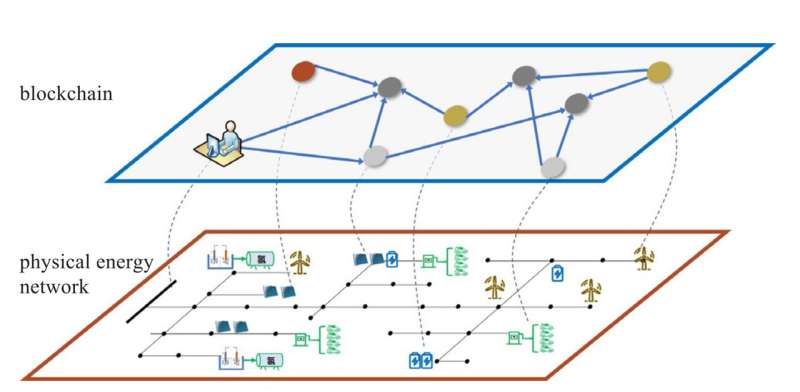by KeAi Communications Co.

Peer-to-peer (P2P) energy trading is a decentralized type of transaction that facilitates the exchange of energy from various sources. By promoting distributed P2P power trading, it is possible to balance the supply and demand of nearby energy resources in an efficient, environmentally friendly manner, making sure fairness is secured. For instance, Lition was launched in 2018 to connect German green energy producers and consumers.
According to Lition’s data, customers on the platform have reportedly saved an average of 20% on their electricity and water bills, while power plants have also seen increased revenues.
Nonetheless, as with all technologies however, there are key challenges to address before we can fully tap their potential. In the case of P2P energy trading, the limitation lies in its safety, efficiency, transparency and operating mechanisms.
To that end, a study published in Global Energy Interconnection explored a blockchain-based environment for such trades and the potential of it to be secure, pragmatic and non-biased. The research team suggests implementing an Arrow-d’Aspremont-Gerard-Varet (AGV) system that encourages realistic reserve pricing and helps establish the correct P2P transaction cost. The positive outcomes are the alignment with Bayesian incentive compatibility and budget balance.
“We believe this is a major development in P2P energy trading,” says Wei Pei, researcher at the Institute of Electrical Engineering Chinese Academy of Sciences and lead author of this study. “In a market economy, every rational economic person has a self-interest side, and their personal behavior will act according to self-interest rules.”
“AGV mechanism as Bayesian incentive-compatible and budget balanced under weak participation requirements,” adds Pei,
Pei and the team also emphasized the mechanism’s benefits for decentralized transactions due to its consideration for individual incentives while maximizing collective value at the same time—a marked difference from the VCG mechanism.
More information:
Yujia Chen et al, Incentive-compatible and budget balanced AGV mechanism for peer-to-peer energy trading in smart grids, Global Energy Interconnection (2023). DOI: 10.1016/j.gloei.2023.02.003
Provided by
KeAi Communications Co.
Citation:
A mechanism for peer-to-peer energy trading in smart grids (2023, April 3)
retrieved 3 April 2023
from https://techxplore.com/news/2023-04-mechanism-peer-to-peer-energy-smart-grids.html
This document is subject to copyright. Apart from any fair dealing for the purpose of private study or research, no
part may be reproduced without the written permission. The content is provided for information purposes only.
Stay connected with us on social media platform for instant update click here to join our Twitter, & Facebook
We are now on Telegram. Click here to join our channel (@TechiUpdate) and stay updated with the latest Technology headlines.
For all the latest Technology News Click Here
For the latest news and updates, follow us on Google News.
